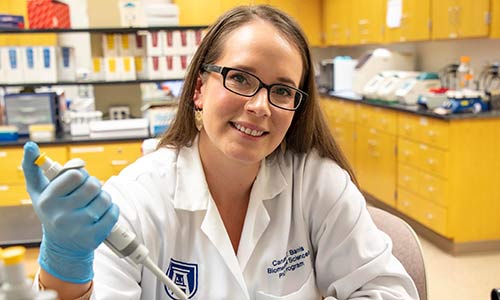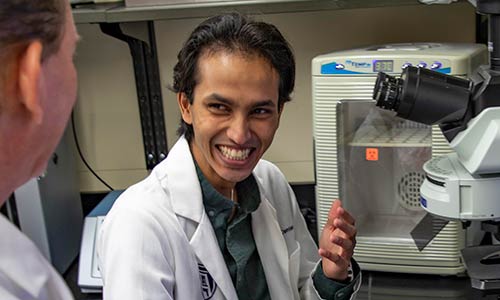
PhD Program: Vascular Biology
Hometown: Suffolk, VA
Mentor: Dr. Eric Belin de Chantemèle
Area of Research: Sex Differences in Obesity-associated Hypertension
Why is your research important?
Obesity effects approximately 42% of the US population and is the leading cause for
hypertension and cardiovascular disease. Interestingly though, men and women develop
obesity-associated hypertension via different mechanisms. My research investigates
these sex differences with the goal of providing knowledge about these sex specific
mechanisms ultimately to devise sex-specific therapeutic treatments.
Why did you choose your degree program?
I chose the Vascular Biology PhD program because it offers exceptional research training.
The VBC boasts an impressive history of being consistently well funded and it houses
a collection of faculty who are well known in their respective fields and committed
to the success of their trainees.
What is the greatest lesson you have learned from your mentor?
“What is the story?” Raw data alone is just numbers but to make science understood
and palatable to others it is imperative to remember that each experiment contributes
to a story, a story meant to be shared with others in order to advance human health.
What have you found most beneficial about your program?
The Vascular Biology Center is highly collaborative and fosters an environment that
encourages camaraderie. Additionally, in a tightknit center, all of the PI’s are mentors,
consistently providing feedback and genuine interest in your progress.
What words of advice do you have for someone considering this program?
The Vascular Biology Center has an excellent history of graduate students obtaining
funding through predoctoral fellowships. It is highly collaborative and offers many
unique opportunities to effectively prepare you for postdoctoral success.
Have you been involved in any AU organizations?
I am a member of the Graduate Student Council, which has been a privilege to amplify the voices of the graduate student body.
What have been some of your most rewarding moments as a CBA student?
When preparing for the Comprehensive exam, there is an unwritten tradition of senior
students initiating study sessions and mock exams. Moments like these exemplify the
camaraderie of the VBC student body of which I feel so privileged to be a part.
What are your career goals?
My short-term goal is to successfully defend my thesis and graduate. My long-term
goal is to become an independent scientist and remain in academia.
What courses in your program curriculum stand out as most helpful for your specific
career goals?
Methods in Cardiovascular Research is a course that gives students exposure to a comprehensive
collection of methods and techniques commonly utilized in cardiovascular research.
What AU resources have been most helpful?
The AU Center for Writing Excellence is a great resource to assist in improving the quality of various writing projects.
I have personally attended Graduate Writing Retreats and grant review Workshops and
found both to be beneficial. They provided personalized support and valuable feedback
throughout the writing process.
What is your Favorite AU memory?
Entering into Candidacy. Being a candidate means I have completed all of the required
coursework and has successfully passed my qualifying exams.
What do you do for fun?
I enjoy spending time with my family, reading mystery and fantasy novels, and watching
British murder mysteries.

PhD Program: Vascular Biology
Hometown: Cumming, Georgia
Mentor: Dr. Joseph Miano
Area of Research: The Transcriptional Regulation of Myocardin in Vascular Smooth Muscle In Vivo
Why is your research important?
Myocardin (MYOCD) is a master regulator of vascular smooth muscle cell differentiation
(VSMC). In cardiovascular disease, reduced Myocd mRNA lead to VSMC dedifferentiation
and disease progression. By shedding light on what regulates the regulator (Myocd)
I will inform significant pathways and potentially druggable targets for translational
therapies and overall improved vascular health.
Why did you choose your degree program?
I choose the VBC because of the incredible support that both faculty and students
give to budding scientists. The department is highly collaborative and well-funded
positioning all who join to become top-notch scientists. The program sets me up for
success in both academia and industry related fields so I feel that my opportunities
have only increased in terms of career potential.
What words of wisdom has your mentor shared with you?
“Nothing substitutes for hard work!"
What have you found most beneficial about your program and research at AU?
The Vascular Biology Center (VBC) is fantastic with hosting events and celebrations
to bring students and faculty closer to each other. Given that I started much younger
than most students, I was initially intimidated by many of my peers; however, this
quickly changed with the incredibly welcoming and supportive environment the faculty
work hard to foster.
What words of advice do you have for someone considering this program at AU?
My greatest advice is to be serious with your choice of lab rotations. Nothing would
be worse than wasting your time and having to join a lab you do not want to be in
and nothing is better than joining a PI that shares your passions.
What have been some of your most rewarding moments while in your program?
The times when I get to present and communicate science to others in the department
are the most rewarding experiences for me. Journal clubs and seminar presentations
are what build young graduate students into excellent scientists and there is no shortage
of these kinds of experiences in the VBC.
What are your career goals?
For my short term goal, I want to become proficient in state-of-the-art technical
skills such as scRNA-seq, CRISPR/Prime editing, chromosomal conformation assays, and
bioinformatics. I also want to go to more conferences to make meaningful connections
with academic colleagues and biotech distributors. My long term goal is still gray
but I know that I want to enter into a top-notch postdoctoral program that could either
lead me into academia or industry (both of which the VBC has set me up well for).
What courses in your program curriculum stand out as most helpful for your specific
career goals?
“Methods in Cardiovascular Research” was a very helpful course in understanding the wide range of options available to
researchers in the cardiovascular field. I highly recommend it to anyone interested
in studying the vasculature and/or the heart.
What AU resources have been most helpful?
The Cores at AU cover a wide breath of different fields however I have found the Transgenic & Genome
Editing Core to be absolutely fantastic. I have utilized the core on several different
occasions and in doing so produced 3 different CRISPR modified mouse lines towards
my thesis (with two more on the way).
What is your Favorite AU memory?
My favorite memory at AU was when the VBC held its historic pizza party in downtown
Augusta during my 2nd year. It was so much fun to get to spend time outside with the
other students and faculty members. Such experiences remind you that everyone is ready
to have a good time regardless of the stress scientific research can impose.
What do you do for fun?
I watch a LOT of anime. This is probably the single largest use of my time besides
sleep and science.
"Congenital Heart Disease (CHD) is a subject that is near and dear to my mentor, Dr. Su, and me. We both share similar personal stories that revealed exactly why we want to pursue this area of research. This instilled in me a great respect for him. Dr. Su pushes me in a way that I have never been pushed before. He believes in me in a way that I often do not even believe in myself. He often tells me to work hard but balance my work and social life, so that I can be as successful as possible."
"I had the opportunity to work in Dr. Fulton’s lab as a lab technician for a couple years and with his encouragement I decided to pursue a PhD. When I was accepted, it was an easy choice to join the Vascular Biology graduate program and continue with Dr. Fulton as my PhD mentor due to the good relationship we already had as well as the great research opportunities.
